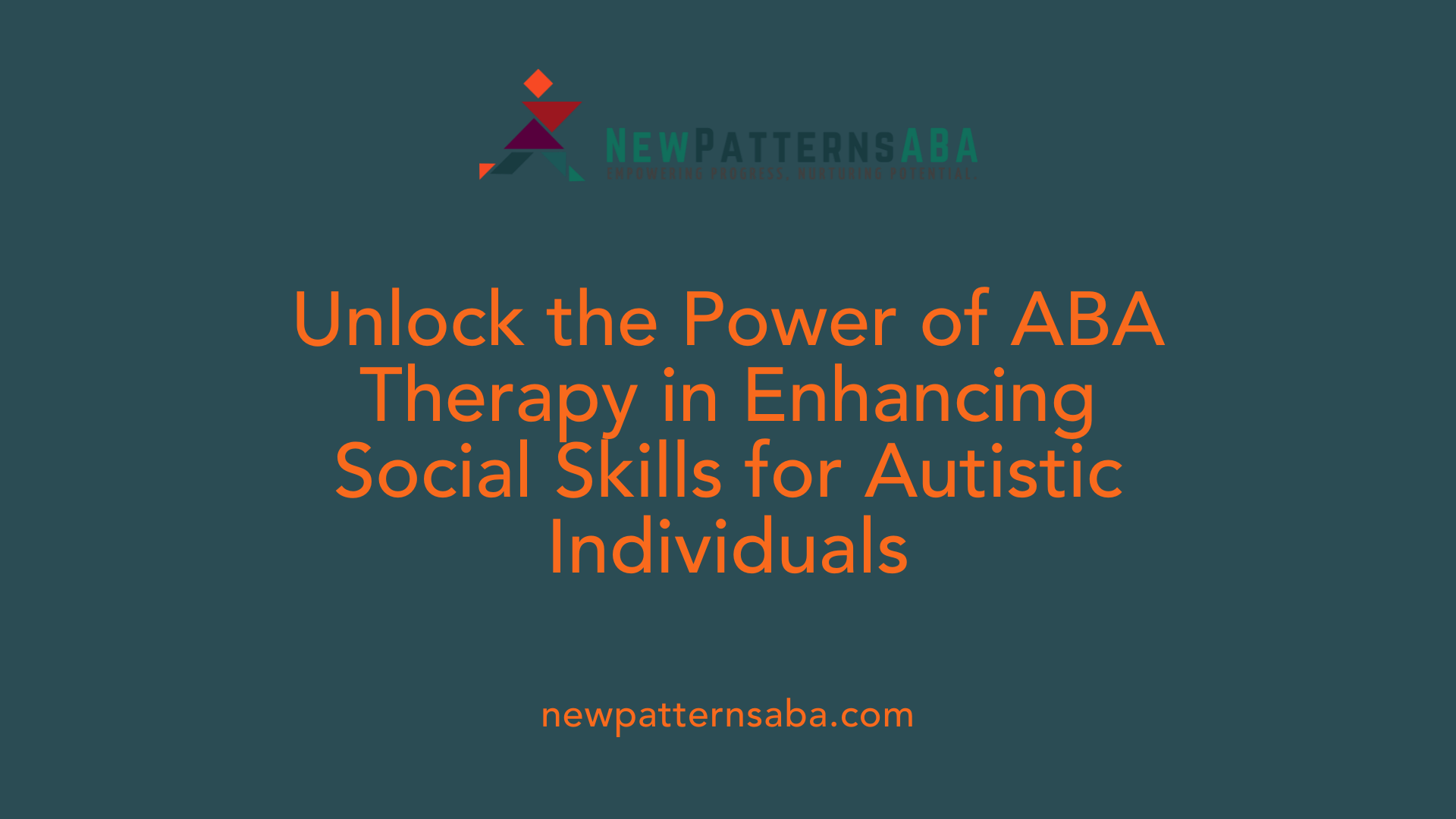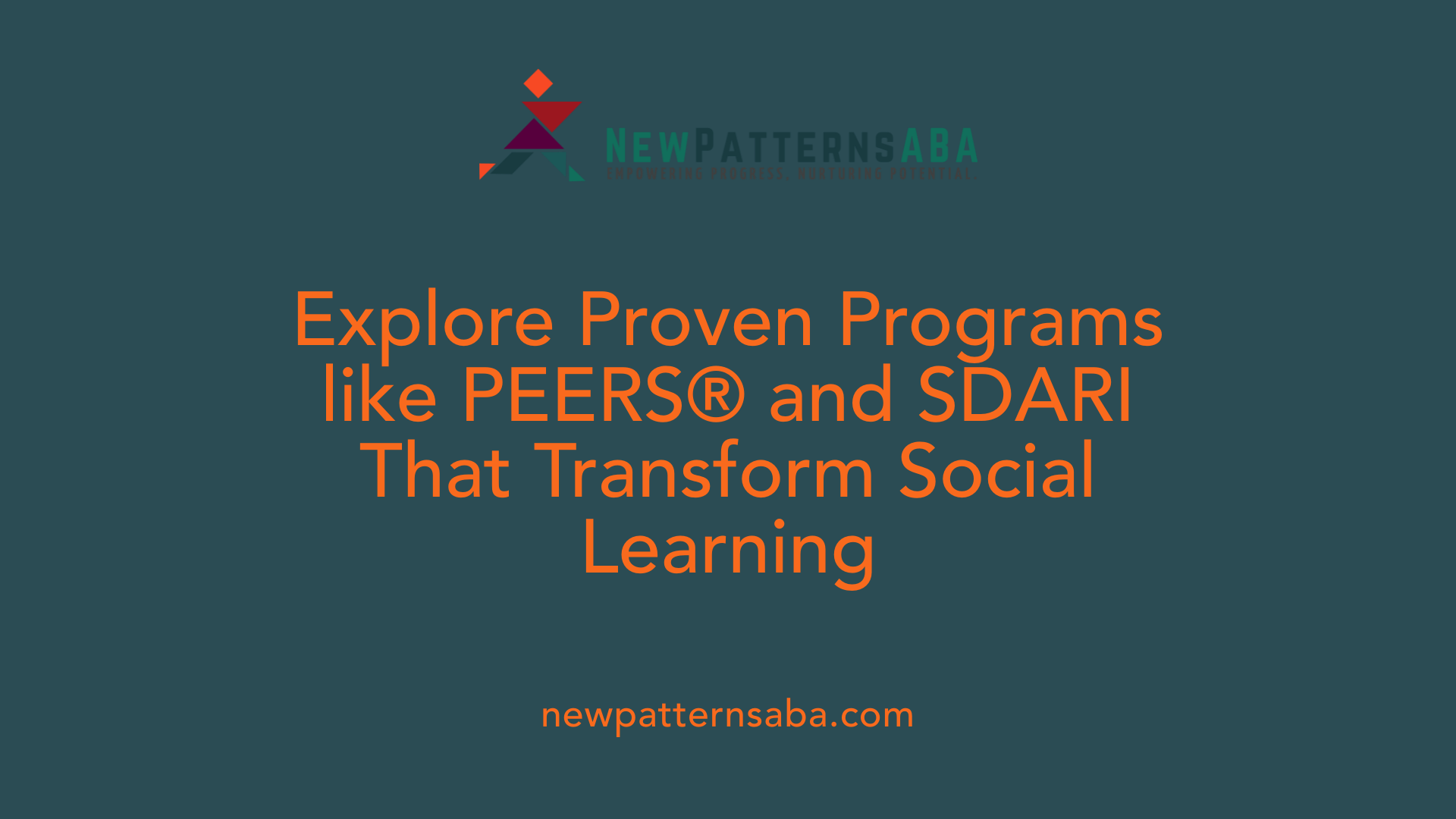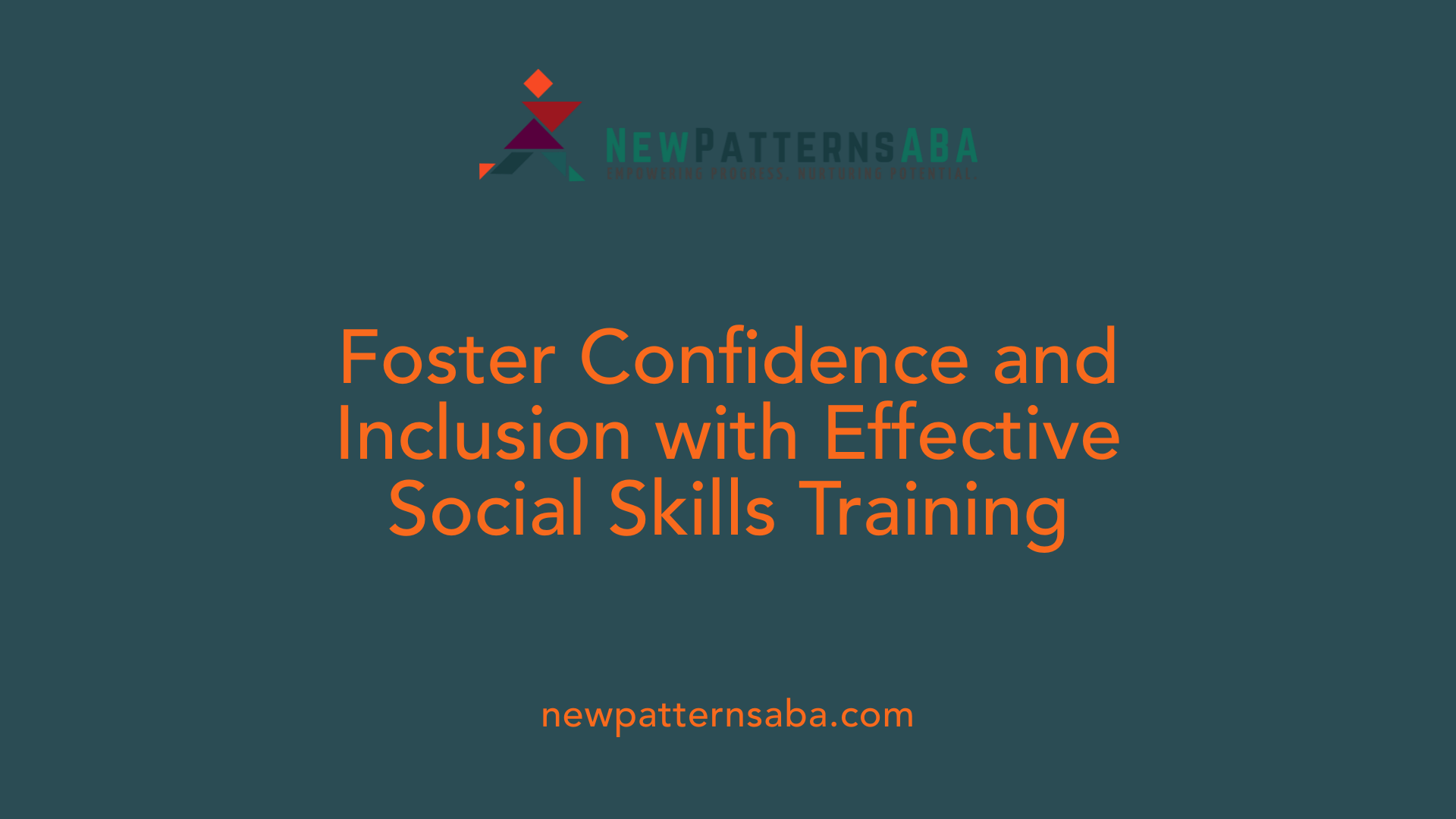The Importance of Social Skills for Autistic Teens
Developing healthy relationship skills is a critical component of supporting autistic teenagers in navigating social interactions confidently and successfully. While many autistic teens desire meaningful social connections, challenges with social communication, understanding cues, and emotional regulation often create barriers. This article explores effective approaches and interventions, including behaviorally based therapies and innovative programs, that help autistic teens build essential social competencies, promoting their confidence, empathy, and lasting friendships.
Understanding ABA Therapy and Its Role in Social Skill Development

What is applied behavior analysis (ABA) therapy?
Applied behavior analysis (ABA) therapy is a scientifically supported treatment aimed at enhancing specific behaviors, social skills, and learning abilities, especially for individuals with autism spectrum disorder. ABA is grounded in learning and behavior principles and uses techniques like positive reinforcement, prompting, and analyzing behavior patterns to shape desired outcomes. Each ABA program is highly individualized, designed and supervised by qualified behavior analysts who continuously assess progress and adjust goals. This method helps increase skills such as communication and attention while decreasing harmful or challenging behaviors, applying effectively across ages and environments.
How does ABA therapy benefit individuals with autism?
ABA therapy promotes the growth of essential skills including communication, social interaction, self-care, and academics. By employing positive reinforcement and modifying the environment, it encourages helpful behaviors and discourages problematic ones. Early and intensive ABA interventions have been shown to yield significant improvements in language, independence, and social engagement. Due to its adaptable nature, ABA incorporates various methods like discrete trial training, natural environment teaching, and play-based strategies, making it suitable for individuals at different developmental levels. Ultimately, ABA empowers those with autism to participate more fully in daily life and community settings.
What methods are used in ABA therapy?
ABA therapy uses multiple evidence-based techniques to foster meaningful behavioral change. These include:
- Positive reinforcement: Rewarding desired behaviors to encourage repetition.
- Discrete trial training (DTT): Step-by-step instructions with structured teaching.
- Modeling: Demonstrating behaviors for the learner to imitate.
- Prompting and fading: Providing cues and gradually removing them as independence grows.
- Behavior chaining: Breaking complex behaviors into smaller segments taught in sequence.
- Natural environment teaching (NET): Utilizing real-world situations to practice skills.
- Visual aids: Using pictures and videos to support learning.
These methods are tailored to individual needs and supported by research for improving communication and social skills while decreasing challenges.
Who provides ABA therapy services?
ABA services are mainly delivered by trained professionals including Board Certified Behavior Analysts (BCBAs), Board Certified Assistant Behavior Analysts (BCaBAs), and Registered Behavior Technicians (RBTs). BCBAs, who usually hold master's degrees, design and oversee treatment plans. BCaBAs support under BCBA supervision, and RBTs work directly with clients implementing therapy. Providers may operate independently or within specialized clinics and organizations offering personalized ABA programs. While multidisciplinary teams such as psychologists, occupational therapists, and speech therapists may assist in diagnosis or related treatments, ABA therapy specifically is delivered by credentialed behavior analysts and technicians to ensure evidence-based, personalized care.
Key Social Skills for Building Healthy Relationships

Essential Social Skills for Autistic Teens
Autistic teens benefit greatly from learning a range of social skills that support forming and maintaining meaningful relationships. These include effective communication, empathy, recognizing social cues, and the ability to resolve conflicts.
Communication, Empathy, and Conflict Resolution
Communication skills involve active listening, appropriate eye contact, and conversational turn-taking. Empathy is crucial and, importantly, autistic children are capable of feeling empathy, which can be fostered to aid social interactions. Conflict resolution skills enable teens to navigate disagreements by improving problem-solving and boosting self-esteem.
Use of Visual Aids and Role-Playing
Teaching through visual aids, like social narratives and cartoons, and role-playing activities help make abstract social concepts concrete. These methods assist autistic teens in understanding when and how to take turns, interpret social cues, and practice empathy. Role-playing scenarios also support emotion recognition by encouraging children to label and discuss feelings.
Understanding and Teaching Personal Space and Boundaries
Personal space is a commonly challenging area; using visual tools and role-playing helps autistic teens understand appropriate distances during interactions. This promotes respect for boundaries and reduces social confusion.
Development of Emotional Recognition and Asking for Help
Helping teens develop emotional recognition through storytelling and role-playing enhances their understanding of emotions in themselves and others. Additionally, instructing them on when and how to ask for help supports their social engagement and fosters independence.
Effective Programs and Interventions for Autistic Teens

What is the PEERS® Program and Its Goals?
The PEERS® program is a widely recognized social skills training designed for adolescents and young adults with autism spectrum disorder. It focuses on teaching crucial abilities such as making and keeping friends, conversational skills, how to join conversations, assessing social acceptance, and managing peer rejection or conflicts. The program emphasizes evidence-based training methods like role-playing, behavioral rehearsals, and homework to help generalize these skills to real-world environments. Additionally, it involves parent participation, making it a parent-assisted intervention with age-appropriate versions, including a preschool program.
How Do Social Narratives and Social Cartooning Help?
Social narratives and social cartooning are valuable tools used to explain and teach social rules and expectations clearly and engagingly. By describing social situations visually or through simple stories, they help autistic teens understand complex social cues and appropriate responses, reducing anxiety and confusion during social interactions.
What Does the SDARI Program Entail?
The Socio-Dramatic Affective Relational Intervention (SDARI) employs performance-based training that uses improvisation games to build social skills. This method incorporates embedded rewards through enjoyable social activities—like co-playing video games—and emphasizes the counselor-teen relationship. By fostering a fun, supportive learning environment, SDARI encourages social engagement and skill development in a naturalistic setting.
How Do Structured Group Settings and Peer Modeling Support Learning?
Structured social groups are carefully designed to offer small, supportive peer settings where autistic teens can practice social interactions safely. Pairing students with peers who model proficient social skills encourages imitation and learning through observation. Teaching empathy and reciprocity within these groups helps strengthen social competence and interest, ensuring a layered and comprehensive social development approach.
What Research Supports These Interventions?
The PEERS® program and other structured social skills interventions like SDARI have strong scientific backing through research funded by reputable institutions including the NIH and CDC. Studies show that methods involving instruction, modeling, role-playing, and peer interaction effectively improve social communication and relationship building among high-functioning autistic teens. Ongoing research aims to tailor these programs further to meet individual needs and improve outcomes.
Tailoring Social Skills Training to Individual Needs
Recognizing Diversity Among Autistic Teens
Autistic adolescents exhibit a wide range of social abilities, motivations, and challenges. Some may actively seek social interaction but struggle with communication, while others might avoid social settings due to feeling overwhelmed. This diversity means that social skills training cannot be one-size-fits-all.
Importance of Customizing Interventions
Effective social skills programs must be personalized to address each teen's unique combination of strengths, preferences, and areas needing support. Tailored interventions optimize engagement and skill acquisition by aligning with individual needs rather than following a rigid curriculum.
Incorporating Individual Strengths Like Humor or Visual Skills
Leveraging personal strengths is a vital strategy in customizing social instruction. For example, using a teen's sense of humor can create natural opportunities for connection, while strong visual skills can guide learning through social narratives or cartooning. Breaking down social skills into manageable parts also helps match instruction to a student’s capabilities.
Parent Involvement and School-Based Facilitation
Parent-assisted programs such as PEERS® integrate family support to reinforce social learning at home. Additionally, school-based facilitation through trained teachers embeds social skills instruction within natural peer interactions. This multifaceted support system enhances the generalization of social skills from training to real-life settings.
Emerging Research on Intervention Efficacy
Ongoing studies emphasize understanding which intervention components work best for different teens with autism. Investigations are focusing on personalized approaches that maximize social competence gains by tailoring methods such as role-playing, behavioral rehearsals, and structured social groups to individual profiles.
These combined strategies promote improved communication, confidence, and social belonging in autistic teens through customized learning experiences.
Complementary Therapies and Multidisciplinary Support
What role do occupational, speech, and physical therapies play?
Occupational therapy supports autistic children by helping them develop daily living skills and adapt to sensory challenges. Speech therapy focuses on language development and improving communication abilities, which are crucial for social interaction. Physical therapy aids in enhancing physical movements, contributing to better overall coordination and participation in social activities.
How do developmental approaches support social skills?
Developmental interventions aim to improve specific skills like language and physical independence. Techniques such as speech and language therapy are commonly combined with behavioral methods like ABA to create a comprehensive support system that addresses multiple areas impacting social skills.
What is the role of psychological therapies such as Cognitive Behavioral Therapy (CBT)?
CBT helps manage mental health challenges often accompanying autism, including anxiety and depression. By changing thoughts and reactions, CBT supports emotional regulation and reduces social anxiety, thereby improving the ability to engage in social situations.
Why is combining therapies with Applied Behavioral Analysis (ABA) important?
ABA remains the most widely accepted and evidence-based method for teaching social skills in autism. When combined with occupational, speech, and psychological therapies, ABA provides a structured framework that enhances learning opportunities across different settings, promoting generalization of social skills.
What are the benefits of sensory integration and emotional regulation support?
Sensory integration therapy assists autistic children in responding appropriately to sensory input, reducing overwhelm that can hinder social interaction. Emotional regulation support, often woven into psychological and social skills programs, empowers children to understand and express their emotions effectively, boosting social competence and relationships.
Building Confidence and a Sense of Belonging Through Social Skills

How Do Social Skills Impact Communication and Self-Esteem?
Social skills are crucial for effective communication and help improve a student's confidence and self-esteem. For students with autism, learning social skills such as eye contact, active listening, and turn-taking enhances their ability to interact meaningfully with others. As these skills develop, students feel more comfortable engaging in social situations rather than avoiding them out of anxiety or uncertainty.
How Do Social Skills Promote Inclusion and Friendships?
By teaching social skills clearly and systematically—including through methods like role-playing, modeling, and peer pairing—students with autism can learn how to make and keep friends. Programs like PEERS® focus on conversational skills, joining groups, and handling peer rejection, which directly promote inclusion. Small structured social groups and peer models help autistic students feel integrated and accepted in their educational environments.
Why Is Teaching Empathy and Reciprocity Important?
Empathy and reciprocity are vital social behaviors that foster meaningful relationships and mutual understanding. Despite misconceptions, autistic children can feel empathy deeply. Teaching empathy through storytelling, role-playing, and discussions helps students recognize others’ emotions and respond appropriately. Reciprocity—the give-and-take in interactions—is also emphasized to encourage balanced social exchanges.
What Are the Long-Term Benefits for Mental Health and Quality of Life?
Mastering social skills not only improves immediate communication but also contributes to better mental health outcomes over time. Effective social interactions build a sense of belonging and reduce feelings of isolation, which can alleviate anxiety and depression. As students gain confidence and expand their social networks, they experience an improved quality of life and greater opportunities for success in academic, personal, and community settings.
Supporting Lifelong Social Competence and Connection
Teaching healthy relationship skills to autistic teens requires a comprehensive, individualized approach that integrates behaviorally based therapies like ABA with innovative social skills programs and complementary multidisciplinary supports. By focusing on essential skills — from communication and empathy to conflict resolution and personal boundaries — and tailoring interventions to each teen's unique needs and strengths, educators and therapists can empower these young individuals to build meaningful friendships and navigate social challenges confidently. Ongoing research and parental involvement further enhance program effectiveness, contributing to a sense of belonging, improved mental health, and lasting social success for autistic teens.
References
- Autism and Social Skills Development
- Teaching social skills to autistic teens, with Elizabeth ...
- Promoting social skills for autistic teens
- 9 Important Social Skills for Autistic Kids to Focus On
- Treatment and Intervention for Autism Spectrum Disorder
- Applied Behavior Analysis (ABA)
- Applied Behavior Analysis (ABA)
- The Controversy Around ABA
- Applied Behavior Analysis (ABA) for Children With Autism





